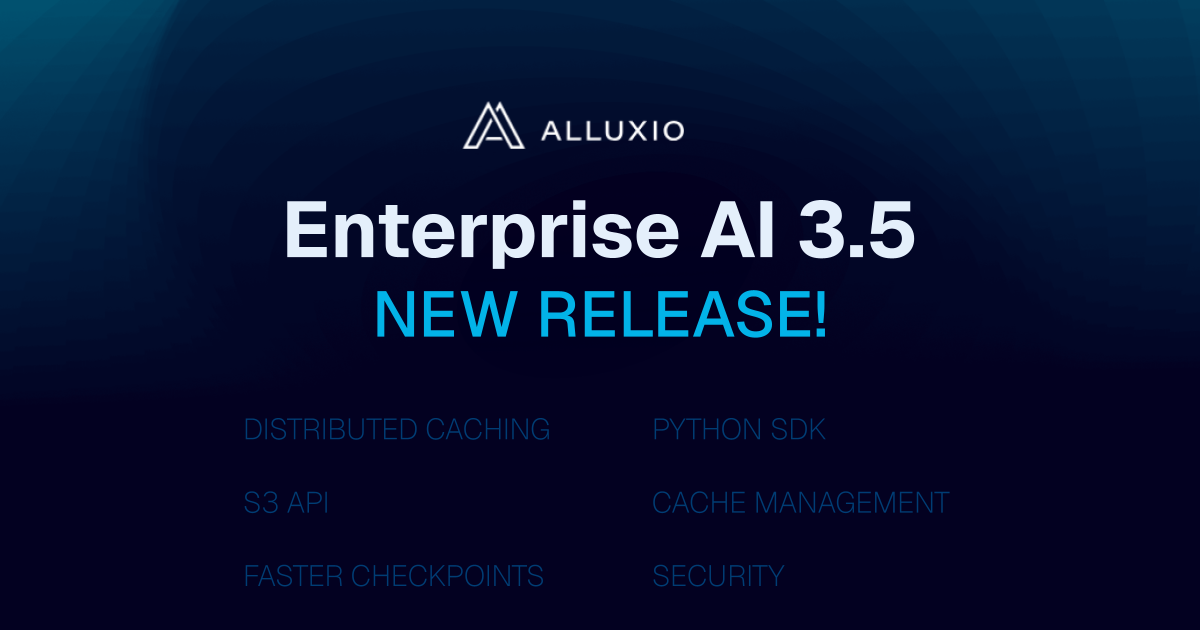What is Alluxio Enterprise for Data Analytics?
Alluxio Enterprise for Data Analytics accelerates query performance for large-scale analytics workloads, reduces cloud storage costs, and simplifies data access. Alluxio’s highly distributed, intelligent cache improves data-intensive query performance and reduces the number of costly cloud storage API and egress charges. Alluxio’s unified namespace provides seamless and secure access to data spread across disparate sources.

What's New in Alluxio Enterprise for Data Analytics 3.2?
1. Evolved Architecture to Maximize Speed and Scale
Alluxio’s next-generation architecture, DORA (Decentralized Object Repository Architecture), dramatically enhances the performance and scalability of large-scale data analytics workloads. Learn more about DORA in this post from our engineering team.

Unlimited Scalability with Decentralized Metadata
With DORA, metadata management is distributed across all Alluxio worker nodes. This decentralized approach enables unlimited scalability, supporting tens of billions of files within a single Alluxio cluster. By eliminating the bottleneck of centralized metadata management, DORA paves the way for unprecedented scalability in data-intensive environments.
Reduced Read Amplification with Page Store
DORA’s Page Store introduces a fine-grained caching system for more efficient data storage and retrieval. This innovative approach reduces read amplification by up to 150 times, significantly improving overall system efficiency. Furthermore, it enhances unstructured file parallel read performance by up to 9 times and boosts structured file position read speed by 2 to 15 times. These improvements translate to faster data access and improved analytics performance across a wide range of workloads.
Improved Performance with Zero-copy Network Transmission
This new release implements a Netty-based data transmission solution, replacing the previous gRPC-based system. This zero-copy approach improves large file sequential read performance by 30-50%, enhances memory efficiency, and boosts overall read performance. As shown in the TPC-DS benchmark results below, compared with not using Alluxio, Alluxio DA 3.2 delivers 2x performance when accessing remote region S3 storage.

Chart: Alluxio DA 3.2 versus No Alluxio remote region S3 (time: ms)
2. Reduced Cloud Storage Egress and API Costs
This latest version of Alluxio substantially reduces operational costs for organizations by minimizing cloud storage API and egress charges. Alluxio Distributed Cache reduces cloud storage API calls and data transfers lowering cloud storage costs while improving query performance.

3. Enhanced Reliability
Reliability gets a major boost in this new release with improved fault tolerance mechanisms. The system now features automatic fallback to the underlying file system, making it more robust and adaptable to Kubernetes and cloud environments. Read more about this feature in the I/O resiliency documentation.
4. Improved Ease of Use
This release introduces Kubernetes-based deployment enhancements, including support for rolling upgrades, making it even easier to manage Alluxio in container orchestration environments. Enhanced metrics visualization provides deeper insights into system performance and resource utilization. The addition of RESTful cache control APIs on DORA gives administrators more flexible and programmatic control over the caching layer, further simplifying management tasks. Read more about Kubernetes integration starting with the install documentation among other pages in the same section.
Try or Upgrade to Alluxio Enterprise for Data Analytics 3.2 Today
Get a personalized demo and see how Alluxio can transform your data infrastructure.
For an exhaustive list of major features in Alluxio Enterprise for Data Analytics 3.2, please refer to our release notes.
Join our community Slack channel with over 10,000 members to ask questions and provide feedback: https://alluxio.io/slack.
.png)
Blog

With the new year comes new features in Alluxio Enterprise AI! Just weeks into 2025 and we are already bringing you exciting new features to better manage, scale, and secure your AI data with Alluxio. From advanced cache management and improved write performance to our Python SDK and S3 API enhancements, our latest release of Alluxio Enterprise AI delivers more power and performance to your AI workloads. Without further ado, let’s dig into the details.
.jpeg)
We’re excited to introduce Rapid Alluxio Deployer (RAD) on AWS, which allows you to experience the performance benefits of Alluxio in less than 30 minutes. RAD is designed with a split-plane architecture, which ensures that your data remains secure within your AWS environment, giving you peace of mind while leveraging Alluxio’s capabilities.

PyTorch is one of the most popular deep learning frameworks in production today. As models become increasingly complex and dataset sizes grow, optimizing model training performance becomes crucial to reduce training times and improve productivity.
